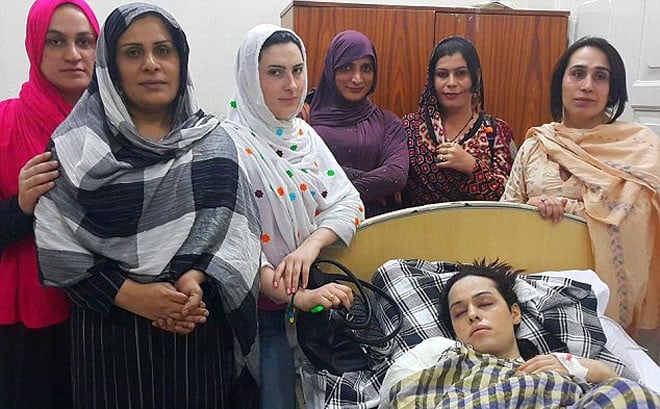
The community has to face violence from both the criminals and the police

It is evident from the sad story of Ashfaq aka Sahiwale, whose children were told by a school teacher not to bother to come to the school again as kids of a ‘hijra’ didn’t need to get education. The khwajasara community in Khyber Pakhtunkhwa and Federally Administered Tribal Areas (Fata) suffers equally with their ‘sisters’ in other parts of Pakistan.
Sahiwale was partly lucky that some influential persons were able to convince the teachers to give admission to the children as being kids of a khwajasara was not a crime. However, the poor khwajasara did not succeed when he opened a small shop in Charsadda in an effort to earn respectable livelihood for his family.
"People simply don’t buy anything from my shop as they hate me for being a khwajasara. I am unable to run the shop that was supposed to feed my family," says Sahiwale to this scribe over the phone in a gloomy voice.
Usmane is another Khwajasara who suffered continuously at the hands of people who want to be entertained by khwajasaras, but at the same time cannot tolerate their existence.
"I had put together 1.5 million rupees from my dance shows at weddings and other functions, but a gangster called Baseerullah snatched all the money from me," says Usmane. "I had to flee Peshawar for Kohat but am again facing death threats from him after my return to Peshawar after three years. He wants me to be his keep and I don’t agree to that," he adds. He claims the police didn’t register his case or give him protection.
The khwajasara community across the country faces all kinds of violence, ranging from physical abuse in streets and markets to extortion of money and snatching of jewellery, mobile phone, and other valuable possessions.
"Not a single khwajasara goes uninvited to any function and we still face insult and physical and sexual abuse in almost every event where we are invited to entertain people," says Farzana Jan, provincial president of TransAction Alliance in Khyber Pakhtunkhwa.
According to Farzana Jan, most of the times the khwajasara discarded by their families end up in the wrong hands as there are many organised groups that force eunuchs to sell their bodies for paid sex.
Read also: Editorial
"Such gangs add to our sufferings as they also motivate us to get involved in criminal activities like drug peddling, mobile snatching and other street crimes. This make us suspect in the eyes of the common people and the police," adds Jan.
The khwajasara community often complains about unprofessional and unjust behaviour of the police in almost all parts of the country. They allege that policemen take money from them on a regular basis, force them to entertain people at functions without paying them, use them for sexual pleasure and torture them, instead of providing them protection.
Jan singles out college and university students living in rented flats -- where khwajasaras also live -- for making life miserable for the deprived community as young and good-looking khwajasaras get raped by students.
"A number of khwajasaras choose to earn their livelihood by getting paid for sex. However, the amount they get depends on the physical appearance, complexion and age of the khwajasara, ranging from Rs20 to Rs100,000 for an hour or less," says Qamar Naseem who runs Blue Veins, an NGO that works for the protection and awareness of the khwajasara community.
Khwajasaras also face problems at the hands of their own community members. "At times, gurus and their khwajasaras fight with each other over the ownership of a community member who is prettier than others and can guarantee fetching more money. They also take help from criminals in sorting out their internal disputes," adds Naseem.
Many khwajasaras who are not pretty or have grown old are forced to beg on the streets in Punjab and Sindh. However, this is considered impossible by the khwajasara community in Peshawar.
"The people here will make us run for our lives if we start begging on the streets. We will become an easy target for those who hate us," Farzana Jan complains.
"Khwajasaras in Sindh also face many problems but they do have a community system in which the Urdu-speaking Muhajir khwajasaras and the Sindhi khwajasaras bond well with their ‘sisters’ of the same ethnic background. However, the Pakhtun khwajasaras from Balochistan and Khyber Pakhtunkhwa do not get that kind of support in Karachi.
The Nirbans who remove their genitals through surgery don’t allow the Akwa -- she-males possessing male genitals despite adopting a female get-up -- to be among them," says Naseem.
Bindya is working for the protection and uplift of the khwajasara community in Karachi. "There are countless issues we face on a daily basis. No one is interested in helping our community and our families refuse to own us," she says in a brief telephonic conversation. "The media, too, isn’t of any help to our community."
Aashee Jee in Lahore, however, has high hopes of changing the lives of her community. "The construction work on a one kanal house for the elderly and extremely vulnerable khwajasaras is underway. I intend to make two or three storeys so that more people could be accommodated," she says.
Aashee Jee is managing "Be Ghar," an NGO for the old and retired members of the khwajasara community. "I come from a very respectable family. One of my brothers is member of the provincial assembly and another is a doctor. I received quality education but my family did not accept me.
One issue that hurts the khwajasara community the most is the absence of religious freedom for them. "The Hindu and Christian khwajasaras face added problems in Pakistan. Being a non-Muslim khwajasara also leads to religious persecution," says Naseem.